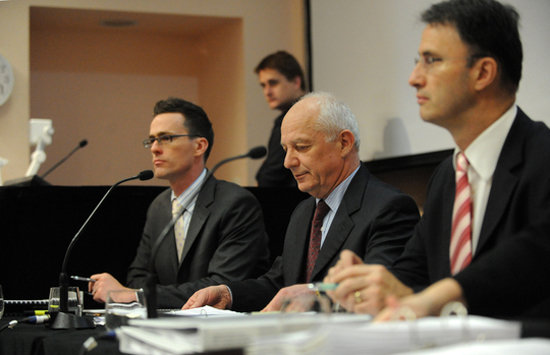
Rodney Tiffen
OPINION: Wild claims that the Finkelstein report recommendations on media regulation increase the threat of government censorship are wrong.
Naomi Wolf has called the Finkelstein report on the press ''step one to fascism''. The former chairman of News Ltd, John Hartigan, saw it as part of a jihad against that company. The Australian Financial Review thought it constituted a Labor plan to control the media.
Other commentators took a similar line. John Roskam, of the Institute of Public Affairs, thought it overturned two centuries of Western political philosophy, and was totalitarian. The Sydney Morning Herald said the futility of its approach collapsed with the Berlin Wall in 1989.
The Australian's Paul Kelly thought it another threat to freedom in Australia, and that it reflected naive hubris. Bob Cronin, group editor-in-chief of West Australian Newspapers, described it as the most outrageous assault on our democracy in the history of the media, and likened its proposals to what was common when Joe Stalin was running the Soviet Union.
While the commentary has been extravagant, the actual reporting of the report's contents has not been extensive. Indeed, it has followed a common path in contemporary Australian political controversy: the volume of vitriol is in inverse proportion to the amount of evidence.
After all the overheated rhetoric, it may be an anti-climax to know that the key issue is the right of reply, or the right of redress, to those who feel they have been misrepresented in the news. Such processes are now done through self-regulation by the Australian Press Council, while the Finkelstein report sees this as insufficiently effective and recommends a government-funded statutory agency.
In Finkelstein's proposal, government's role would be limited to providing the funding and legislative framework. The composition of the News Media Council would be identical to the current Press Council's: half from the industry, half from the public, and an independent chair.
As the executive summary states, its standards would be essentially the same as the current Press Council's - not more stringent or restrictive, as some seem to believe.
Similar process
Moreover, the process would also be similar. The outcome - if a complaint went to adjudication and was not settled by conciliation - would be a statement published about the case.
Both systems share a process whereby complainants give up the right to pursue other legal remedies. Both seek to institute a corrections process that removes financial and legal risks from both parties and resolves complaints in a way that increases rather than restricts public knowledge.
So a body with a similar composition to the Press Council, following similar guidelines, would adopt a similar process with similar outcomes. So why not just keep the Press Council? One reason is that the council, relying on publishers' support, has never been adequately or securely funded.
Its current chairman, like his two predecessors, thinks the council is chronically underfunded and so cannot achieve its goals. It is just a few years since News Ltd cut its funding substantially because it disapproved of a Press Council project.
A second reason is that a system of accountability where those being held accountable can walk away or threaten to reduce funding whenever they wish is by nature very weak. It is why Kerry Packer and countless others have called the Press Council a toothless tiger.
It is fitting that as this Australian debate takes place, the British Press Complaints Commission has been dissolved in disgrace. Like its predecessors, it was very much a publishers' poodle. When serious wrong-doing by the News of the World was exposed, it simply defended the paper until the scandal overwhelmed everyone's defences. It is not yet clear what will replace the commission, although it may be a statutory authority.
The controversial aspect of the Finkelstein proposal is that these inherent weaknesses of the Press Council mean there is a need for government involvement. This produces a reflex response among many that either censorship or corruption must follow. It should be remembered that all Australian TV and radio stations are publicly licensed but are obviously vigorous and independent, while the public broadcaster, the ABC, consistently ranks as the most trusted media organisation in the country.
Sharpest conflict
The sharpest conflict comes because, under the new proposal, publishers would not be able to opt out as they choose, but instead would have to publish the council's findings. Also, the idea is that they would publish them in a regular agreed place in the paper so that adverse findings would not be buried.
So two centuries of Western thought comes down to this - the right of editors to withhold from their readers the knowledge of an unwelcome adjudication on one of their stories by their peers and public according to standards they all profess to hold.
The proposal is an attempt to make the media more accountable to their readers and those covered in the news. It does not increase the power of government to censor or restrict the media in any way. It seeks to conciliate and resolve disputes about news coverage in ways that further the free flow and exchange of information rather than restricting it.
Dr Rodney Tiffen is an emeritus professor of government and international relations at Sydney University and worked on the Finkelstein media inquiry. The article was first published in The Sydney Morning Herald.

This work is licensed under a Creative Commons Attribution-NonCommercial 3.0 New Zealand Licence.
OTHER VIEWS
Why the market can't ensure a free press - Wendy Bacon, New Matilda
Attack by The Australian supports case against 'self-regulation' - Mark Pearson, Journlaw
Finkelstein report: Media’s great divide - Cameron Stewart, The Australian
Finkelstein inquiry report cause for 'cautious optimism' - Andrea Carson, The Conversation
Why Finkelstein is not Judge Dread - Alan Kohler, Business Spectator
Media inquiry ignores value of diversity - Jason Wilson, The Drum



